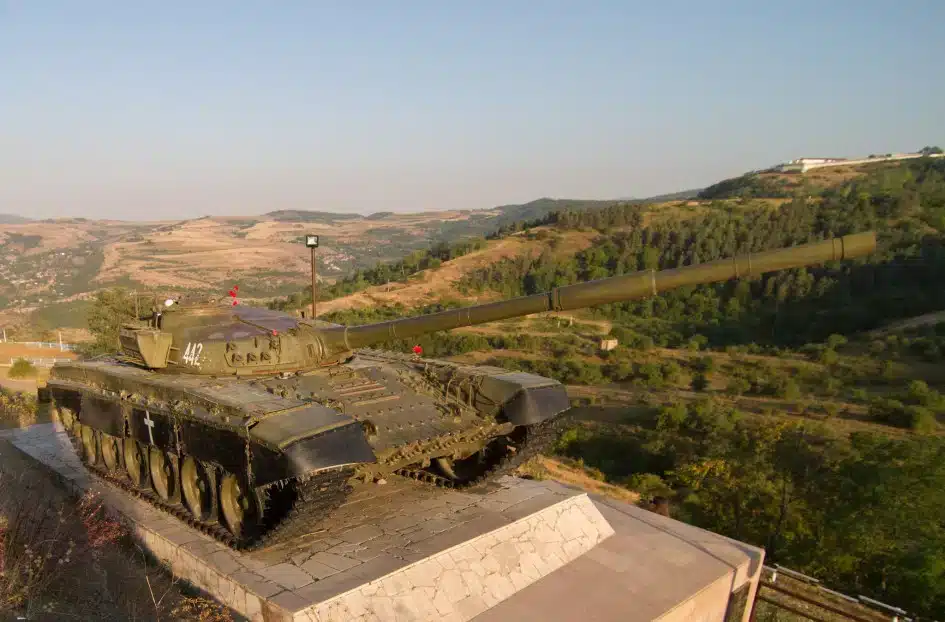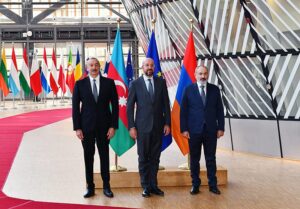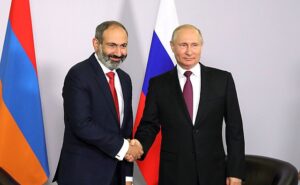Tank memorial in Nagorno-Karabakh, 2017 (source: Flickr)
After 4,5 months, Azerbaijani self-proclaimed activists ceased their blockade of the Lachin corridor, the main road that connects the region of Nagorno-Karabakh with Armenia. Azerbaijani authorities installed a new border checkpoint at the opposite end of the road on April 23, causing the activists’ blockade to become redundant. It demonstrates the ties between the ‘eco-activists’ and Azerbaijani authorities. Meanwhile, Azerbaijani and Armenian diplomats are in talks to improve relations and make arrangements on the Nagorno-Karabakh region, mediated by the United States.
138 days of blockade
Since December 2022, activists blocked the Lachin Corridor, the main highway connecting mainland Armenia to Nagorno-Karabakh, where many ethnic Armenians live. They said to protest illegal exploitation of minerals in the region by Armenian authorities, and the environmental impact of such mining. Armenian authorities, among others, accused Baku of staging the protests to cause unrest among the Russian peacekeeping contingency and overall peace process between Armenia and Azerbaijan. Azerbaijani-instigated protests rarely occur without the consent of its governmental authorities.
Armenia exports around 400 tons of essential goods to Nagorno-Karabakh each day. As the blockade endured, it could had extensive humanitarian consequences. There were many shortages of basic needs during the winter.
Geopolitical stand-off between Armenia and Azerbaijan
Both Armenia and Azerbaijan lie a claim on the region of Nagorno-Karabakh since the dissolution of the Soviet Union. Most residents in the enclave identify themselves as Armenian, and the region been governed by Armenian authorities – the Republic of Artsakh – since the 1990s. Many in the region fear ethnic conflict, as this had already occurred in the region during the First Nagorno-Karabakh War (1988-1994). Internationally, most states currently recognise Nagorno-Karabakh as Azerbaijani territory, following the borders of Soviet times.
In a bloody conflict in 2020, Azerbaijan re-conquered most of Nagorno-Karabakh. It caused thousands of deaths on both sides. Since then, both countries try to conclude a peace process led by Russia and a ceasefire is enforced by Russian peacekeepers in the region. However, this could not prevent new hostilities in September 2022, when Azerbaijani forces invaded sovereign, internationally recognised Armenian territories, killing hundreds.
No response by Russian authorities
Russian peacekeepers, who should be the providers of safe traffic through the Lachin Corridor, have not responded to the blockade by the activists, nor did they when Azerbaijani authorities opened a checkpoint on April 23.
A couple of hours after the activists’ decision to end their blockade, they praised the checkpoint by saying that “this decisive step aimed at preventing illegality in the territories of Azerbaijan means that the participants of the demonstration have partially achieved their goals.”
Peace talks
Russia’s influence has been wearing in the Southern Caucasus. As Russian attention has shifted to Ukraine, western powers such as the EU and US try to mediate in the conflict. The EU recently deployed a civilian mission in the border region between Armenia and Azerbaijan. Lately, the US started a new round of peace talks, hosted by Secretary of State Anthony Blinken. After a meeting on May 4, both parties’ Ministers of Foreign Affairs expressed a positive outlook towards further talks in the upcoming months: “We (red.) made progress in mutual understanding on some articles of the draft bilateral agreement on the Establishment Of Peace And Interstate Relations. The two ministers expressed their appreciation to the American side for hosting the negotiations between Armenia and Azerbaijan. The parties have agreed to continue discussions.”
Situation remains volatile
Recent peace talks are positive, and can hopefully prevent another rounds of violence. The 2020 war and more recent hostilities have traumatized communities in Nagorno-Karabakh and beyond. However, as the september 2022 hostilities shown, the situation remains highly volatile and could flare up very quickly again. As long as Azerbaijan and Armenia are not bound to clearly regulated and enforced peace provisions – violence, blockades, and other means of disruption quickly become a tool for imposing certain conditions on a counterpart. In this case, it remains pivotal that the US and other western allies keep sanctions and other forms of repercussion on the table if Azerbaijan wishes to violate peace provisions, as they have done in the past year. This is especially the case now Russia, the main peacekeeping force since the 2020 war, has become an capricious actor that does not enforce peace agreements in a clear manner.



